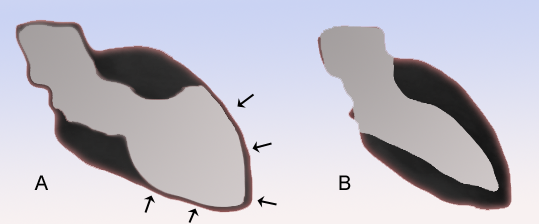January 3, 2011
-
Broken Heart Syndrome, or what octopus?
An 86 year old woman comes to the cardiac unit because she experienced an episode of syncope (e.g. she fainted). An EKG done at the time of her admission showed she was in complete heart block, meaning her atria (the upper heart chambers) and her ventricles (the lower heart chambers) were all beating at complete different rates rather than in one organized cohesive fashion.
Initially, as part of the workup we check her meds, ask her about any history of irregular heart beats and do a ct to rule out a stroke. We also send her down to the cardiac cath lab to examine her coronary vessels for any blockages, MI or embolism being other possible causes of syncope.
And then the surprise.
Her heart vessels were completely clear. No blockages, decent ejection fraction, no apparently obvious reason for her to have suffered an arrythmia and syncopal event.
Until we learned that her husband and son had died one year previously on dec 22nd, the anniversary of which she had celebrated only a few days before her episode and subsequent admission.
Why would that matter? Because of Takotsubo Syndrome aka Stress Induced Cardiomyopathy aka Broken Heart Syndrome
Takotsubo is a sudden temporary weakening of the heart muscle that can often be triggered by severe emotional stress. EKG changes will often appear similar to an anterior heart attack, but on angiogram, vessels will be clear. However, further inspection of the heart anatomy will reveal a bulging apex with a hypercontractile base of the heart

This anatomy makes the heart look like an octopus stuck in a japanese octopus trap or a “tako tsubo”. It’s though that this is caused by high levels of circulating catecholamines (stress hormones like epinephrine) circulating at the microvesicular level, possibly causing vasospasm.
This condition is somewhat rare, and tends to affect mostly postmenopausal women. In those affected, heart function will actually improve to near normal levels within 2 months provided the individual survives their initial attack. While women are twice as likely to suffer from broken heart syndrome, men are 6 times more likely to die from it.
The good news for my patient is that she survived her attack and got an implanted cardiac defibrillator so if she should suffer another arrythmia she can be knocked out of it.
Bet you didnt know you really COULD die of a broken heart…so next time you see a friend who is down in the dumps, ask them if they need any help with fixing their octopus trap
-Dr J
Comments (3)
Wow, stress is no joke…
wow, I didn’t know there was a biological explanation for that. Wow. cool post
My gramps passed away a week right after my granny did. It is possible.